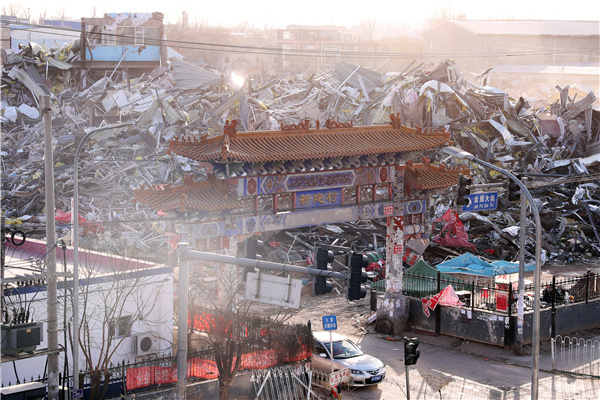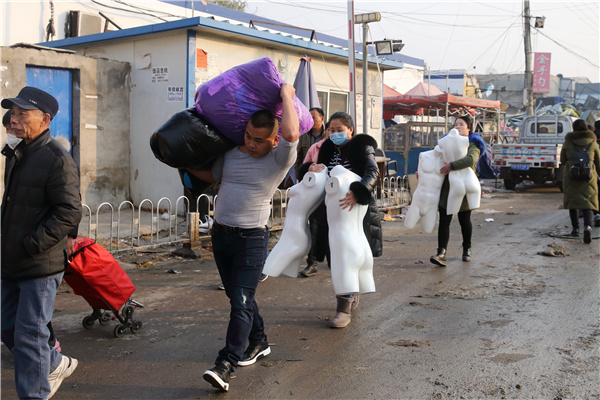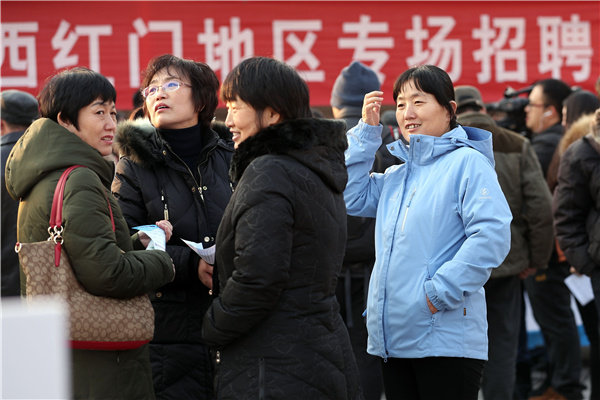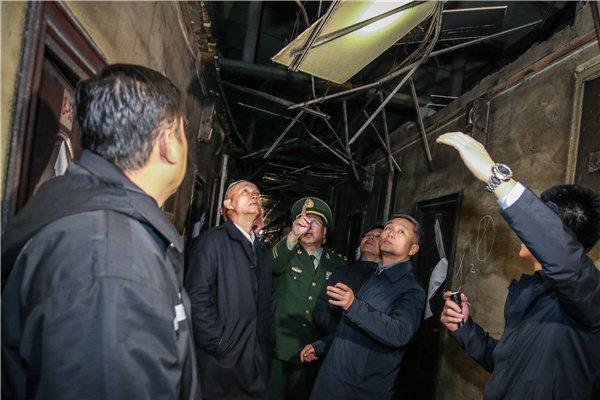
Yuan Wuneng and his wife have slept in a truck since their home was destroyed in the deadly blaze at Beijing’s Jufuyuan apartment complex on Nov 18.
The couple moved to the capital 12 years ago in search of a better life. “Now, all our belongings are gone,” Yuan said late on Tuesday, as he sought shelter from the harsh winter wind.
“It’s getting colder. Soon it will be almost impossible to sleep in the truck,” he said. “We need to find an apartment fast.”
Nineteen people died, including eight children, when flames ripped through the three-story residential block, which was home to more than 400 tenants, in Beijing’s southern Daxing district.
The tragedy ignited public anger not only as it exposed serious safety hazards, but also because of the subsequent 40-day cleanup campaign that saw many tenants in unsafe properties evicted with little warning or support.
“There are too many lessons to be learned from this fire,” said Yang Xiaojun, a professor of administrative law at the Chinese Academy of Governance in Beijing. “For those living in such environments, it’s a safety warning. For the government, it’s a growing pain and a lesson in social governance.”
Fire began spreading through Jufuyuan around 6:15 pm. Investigations show it was started by an electrical fault in a newly installed refrigeration unit in the basement, and that flammable materials in ceiling and wall partitions gave off poisonous gases as they burned.
The crowded building was a death trap, according to Wei Yiyu, director of fire supervision in Daxing. “Its ceilings were made of polystyrene. Also, gas and smoke would have spread to every room quickly because the partitions didn’t reach the ceiling. That dramatically reduced the time people had to escape,” he said.
Yuan, 36, moved into the Jufuyuan apartment block about two years ago. The cheap rent was his only consideration. “To be honest, safety issues never crossed my mind,” he said, adding that he was also attracted by the building’s name, which translates as “gathering lucky fate”.
He and his wife rented a room of about 20 square meters for 700 yuan ($105) a month, which was already a luxury, as the area-known as Xinjian’er-has many similar apartments at even cheaper prices.
Like many residents, Yuan, who is from Xingtai in Hebei province, made a living running a small textile business. The streets are dotted with such workshops, some of which double as dormitories for employees.
Jufuyuan was in a “three-in-one” industrial compound, so-called because it provided space for accommodations, workshops and warehouses. These compounds were introduced in Beijing in the 1980s to boost rural economies.
Village committees were encouraged to attract enterprises to these compounds by offering factory space and warehouses, particularly in Daxing, Tongzhou and Changping districts, which at the time were rural suburbs.
As the city developed, these pockets of industry grew into communities packed with small workshops, as well as restaurants and grocery stores to cater to the residents, mostly migrant workers and small-business owners.

With the boom in e-commerce, many express delivery companies have opened storehouses and stationed employees in these compounds due to the low rent.
However, over the years, many buildings were illegally renovated, often to transform large spaces into small, cheap apartments, such as at Jufuyuan. Authorities say this resulted in safety hazards that have led to several accidents, including a fire in April at a workshop making neon lights in Changping. On that occasion, no casualties were reported.
For failing to address these risks, three officials were suspended from their posts on Wednesday: Du Zhiyong, deputy director of the Daxing government; Si Wentao, head of Xihongmen township; and Zheng Yajun, Xihongmen’s Party chief. They are being investigated by the city’s discipline inspection authorities, the Party watchdog.
Legislators also accepted the resignation of Cui Zhicheng, head of the district government, on Wednesday, although it was not immediately clear whether this was connected with the fatal fire on Nov 18.
Public response
Cai Qi, the capital’s Party chief, described the Jufuyuan tragedy as a lesson “paid with blood”. He said it made authorities realize the urgency of intensifying efforts to eliminate fire and other safety risks in crowded buildings that serve as storage areas, workshops or dormitories.
On Nov 20, two days after the blaze, the city’s Work Safety Committee launched a 40-day campaign to identify and remove potential hazards. Within five days, inspectors had reported finding 25,309 hazards.
Yet as the campaign was rolled out, stories about tenants being evicted on short notice from properties classified as unsafe quickly began to gain attention on social media. Netizens were outraged by images of people standing in streets in the freezing weather clutching their belongings.
With no alternative accommodations provided, some of those affected had to leave the city behind and return to their hometowns.
“Social problems cannot be solved overnight,” said Yang at the Chinese Academy of Governance. “Many people live in such unsafe apartments in order to make a living in Beijing, and they have nowhere else to go.
“The fire was an emergency, but the government should have made a more comprehensive plan before launching the safety campaign,” he added. “The government is dealing with people in various employment, different living situations and with different demands, so being impetuous is not practical and will only bring frustration.”
Zheng Baokun, 50, a resident of Xinjian’er, said he understands the government’s intention to remove safety hazards, but he hoped officials could show more consideration.
He took a stroll through his neighborhood with his 2-year-old grandson on Wednesday afternoon. Several unsafe buildings had already been torn down, while some stood semi-demolished like giant dollhouses, with furniture and wallpaper still intact in some apartments, he said.
“The village is empty now. People have moved away within days (of the fire) because their businesses or apartments were found unsafe. We have no place to do our grocery shopping at the moment,” Zheng said.

He estimated that Xinjian’er is home to 2,000 residents with Beijing hukou, or permanent residency, as well as 20,000 to 30,000 people from elsewhere in China.
“Some were told on Nov 21 to move out by Nov 22. How can that be possible? No one in Beijing deserves to be treated like that,” he added.
As many of the people who live in unsafe and cheap apartments are migrant workers, some began to speculate the government’s real intention was to force the “low-end workforce” out of Beijing.
The Beijing Work Safety Committee denied the accusation, saying it has never used the term. Yet the authority did concede that the enforcement measures in some areas had been “simple and blunt” because individual officials were eager to see quick results.
Yuan said he doesn’t believe the evictions are aimed at forcing out migrant workers like himself, but the government should be more considerate when implementing such campaigns, as they affect so many people.
Fair treatment
In the face of a public outcry, city authorities have attempted to rectify the problems with the safety campaign. On Monday, Cai, the capital’s Party chief, urged officials at all levels to carry out their duties in eliminating safety hazards with “humanistic care” and by using “better methods”, while making it clear that those affected should be given support.
“I’ve heard the government will give us more time to empty the workshop, but we’ve already removed all our machines and shipped them out, so I don’t know whether I should be feeling happy or sad,” a worker surnamed Hu at Fadiluwang clothes factory in Xinjian’er said on Wednesday.
“All I know is that tomorrow I’m moving to Hebei, where the new workshop will be located.”
A job fair was also held in Xihongmen on Monday for those people who lost their jobs when their employers were told to shut down unsafe factories or warehouses.
More fairs are being planned, according to Chen Yongqiang, deputy head of the township government.
For migrant workers who have decided to try their luck outside Beijing, the government will provide temporary accommodation as well as train or bus tickets to their intended destination, he added.



